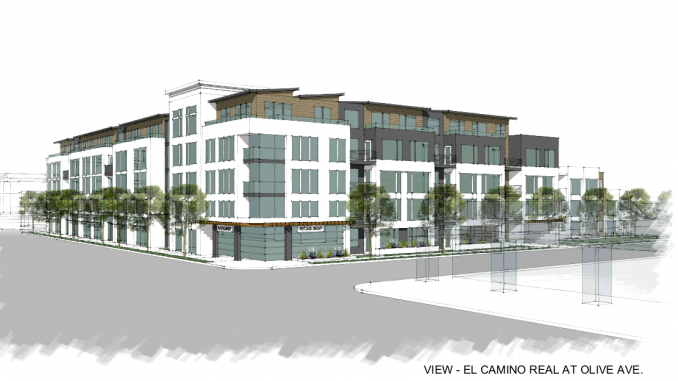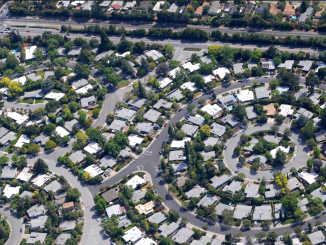
BY ELAINE GOODMAN
Daily Post Correspondent
The Palo Alto City Council on Tuesday (Jan. 19) will discuss a developer’s proposal for a five-story building with 113 apartments plus offices and retail at 2951 El Camino Real.
The developer, Acclaim Companies of Menlo Park, has scaled back the project in response to council members’ feedback in October.
Acclaim has reduced the size of the project by about 7%: from 132,096 square feet to the currently proposed 122,258 square feet.
The number of apartments has been reduced from 119 to 113. Twenty-three units, rather than the previously proposed 24 units, would be for low-income residents.
At its highest point, the building would be 58 feet tall — shorter than the previously proposed maximum height of 65 feet. The building was also redesigned to address concerns that it would block sunlight on neighboring properties.
The project would include 162 parking spaces in an underground garage, down from 176 spaces, with a mechanical lift to stack parked cars. There would be 1,000 square feet for retail and 5,000 square feet for offices, the same as in the previous proposal.
The project site is about a block south of Oregon Expressway/Page Mill Road. It sits next to a neighborhood of single-family homes on Pepper and Olive avenues.
Under the city’s current zoning for the site, the height limit for the project would be 35 feet because it is within 150 feet of single-family homes. As currently proposed, the project would be 34 feet tall next to the homes, but increase in height toward El Camino Real, with elevator or stairway enclosures rising to 58 feet.
Meeting the housing quota
The developer is hoping to receive approval for the excess height through Planned Home Zoning, a tool the council approved last year to encourage housing development. Palo Alto is facing a housing quota that could be as much as 10,058 new homes between 2023 and 2031. The quota, from the Association of Bay Area Governments, or ABAG, is not yet finalized.
Under Planned Home Zoning, a project may be able to exceed zoning limits if 20% of its housing units are designated for low-income residents. In addition, the project must not add to the demand for housing by creating more jobs than were at the site before it was built.
The council considers each Planned Home Zoning proposal on a case-by-case basis.
The proposed project at 2951 El Camino would also need Planned Home Zoning because it exceeds the current maximum for floor area ratio — a building’s total square footage divided by the size of the lot. The proposed building’s FAR would be 2.55, well above the current limit of 1.5.
Impact on neighboring homes considered
On Jan. 19, the council will conduct a “pre-screening” of the project, in which council members weigh in on the proposal before the developer submits a formal application.
During a pre-screening of the previous version of the proposal on Oct. 5, council members said they were worried about the height of the project and its impact on neighboring homes.
“I’m not really in favor of exceeding the height limit,” said Councilman Tom DuBois, who is now serving as mayor. “This is a substantial amount of livable space that’s up above height limit.”
DuBois was also concerned that the proposal is being considered while the city is still developing a coordinated area plan for the North Ventura neighborhood, which includes the project site. He said the city should think about blocking new commercial development in the area until the North Ventura plan is finished.
The council has conducted a pre-screening for one other project seeking Planned Home Zoning. That was Sand Hill Property Co.’s proposal for a two-story office building and five-story building containing 187 housing units at 3300 El Camino Real.
During the October meeting, then-Mayor Adrian Fine said the developer is no longer pursuing the 3300 El Camino project.
“That project is not going forward, as the developer felt we were too strong in our criticisms,” said Fine, whose term on the council ended this month. “That’s 187 housing units lost in Palo Alto. … We’re going to end up with an office building and a parking lot.”
The proposed building at 2951 El Camino Real would include a mix of apartment types: 24 studios; 65 one-bedroom units; and 24 two-bedroom units.
That’s a change from 21 studios, 66 one-bedroom units, and 32 two-bedroom units in the developer’s previous proposal.
The 23 apartments reserved for low-income residents in the current proposal would likely be distributed across a range of income levels, according to a report to the council.


